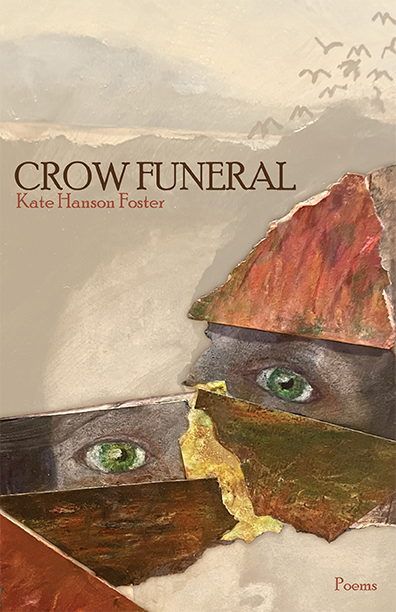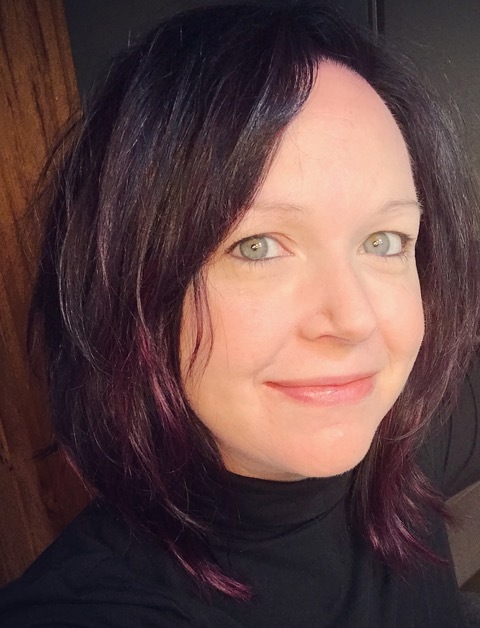Getting to Know Kate Hanson Foster, Author of Crow Funeral
When did you first encounter poetry? How did you discover that you wanted to write poems?
There isn’t one single moment I can remember where I encountered “poetry” for the first time. I put the word poetry in quotes just now because I think before discovering poetry as a craft, I have always been taken by any language that carries the delight of surprise. It can be a line in a story, a lyric in a song, or even a good joke that generates a wonderment of feeling like I am hearing something for the first time. I envied the ability to work with language that could create that kind of emotional impact. Later in my adolescent years, Sylvia Plath’s Ariel sticks out as one of the first books that made me passionate about the craft of poetry. I’ve read that book probably a thousand times, and that feeling of delight and surprise, to this day, has not faded. That’s powerful, smart poetry—a good poem that says what I somehow could not, something I wish I could say, something I try to capture on my own whenever I sit down to write.
Do you have a writing routine? A favorite time or place to write?
Having three children has taught me that the concept of “routine” when it comes to writing requires tremendous flexibility. At this point, I simply write whenever I can, wherever I can. But if I had my way, it would be in the morning when my mind is fresh. I’ve never been a sit-at-the-desk type. I’m perfectly content to sit in bed propped up by a bunch of pillows and surrounded by a bunch of books.
Where do your poems most often “come from”—an image, a sound, a phrase, an idea?
Writing poetry for me is a kind of meditation. I try to access this strange place in my brain, and I don’t always have the key. I think my better poems are when that door opens and I start piecing phrases and thoughts together. Oddly enough the “idea” of a poem usually comes afterwards. I liken it to piecing together a puzzle, one that must be created and assembled simultaneously. That’s not to say all my poems arrive on wings from the ether. It’s a balancing act of subconscious and conscious thought, an intention, and then the craft of using sound, space, line breaks, form—all as a way to get the end result of what I’m searching for.
Which writers (living or dead) have influenced you the most?
Writers I always return to for inspiration are Plath, Neruda, Muriel Rukeyser, Rilke, Donald Hall, and Franz Wright, just to name a few off the top of my head. Among my contemporaries there are so many writers out there that excite me right now: Michael Kleber-Diggs, Michael Schmeltzer, Matt W. Miller, Heather Bell—I’ll admit I’m name dropping some of my friends, but they are all friendships built on poetry. They are all unique poets in their individual styles and approach to writing, and they each challenge my writing in different ways. And mostly they are writing poems right now that make me jealous I didn’t write them myself.
What excites you most about your new collection?
My new collection, Crow Funeral has been assembled, reassembled, buried and excavated, burned, and then rewritten from the ashes. Let’s just say it was a process that went on for about 7 years. The best way the book has been described is “the end result of intention and design gone off script”. I wanted to write about the phenomenon described as “Crow Funerals,” and the human fascination with whether crows have the ability to mourn their dead. But I was also dealing with postpartum depression and anxiety, and my mental health began to converge with ideas of anthropomorphism and our human need to insert larger meaning into simple things. Crow Funeral as a collection is probably the most honest work I’ve written, and I think it’s because I let myself give in to my mental obstacles. In many ways, it’s a crisis of the mind and self, meaning and faith, motherhood and womanhood. It all sounds so dire—but there’s hope, I think, in conceding to crisis. It allowed me to get closer to a concept of “truth” in my poetry. A truth that if even only my own, might impact or inspire a reader in some way.

Godless
It is not The Word
that brings me to a perfect halt.
It is a hard, unbreakable consonant
that hurts my mouth like an olive pit.
Something clean, something
finished in my inner ear.
And outside:
All lung and no breath. It is easy
to remember this kind of stillness.
I want it on my skin
like a tick. I want to lie down
like a dog for what it might give me.
In the compost across the yard,
bugs suck at my scraps.
Fire soot—coffee grind—
apple core—and I think:
Save nothing. And I am in love.
I am in love with this quiet church.
Originally published by Mass Poetry, Poem of The Moment

Kate Hanson Foster is the author of Crow Funeral from EastOver Press 2022. Her first collection of poems, Mid Drift was a finalist for the Massachusetts Center for the Book Award. Her writing has appeared in Birmingham Poetry Review, Comstock Review, Harpur Palate, Poet Lore, Salamander, Tupelo Quarterly, and elsewhere. A recipient of the NEA Parent Fellowship through the Vermont Studio Center, she lives and writes in Groton, Massachusetts.
